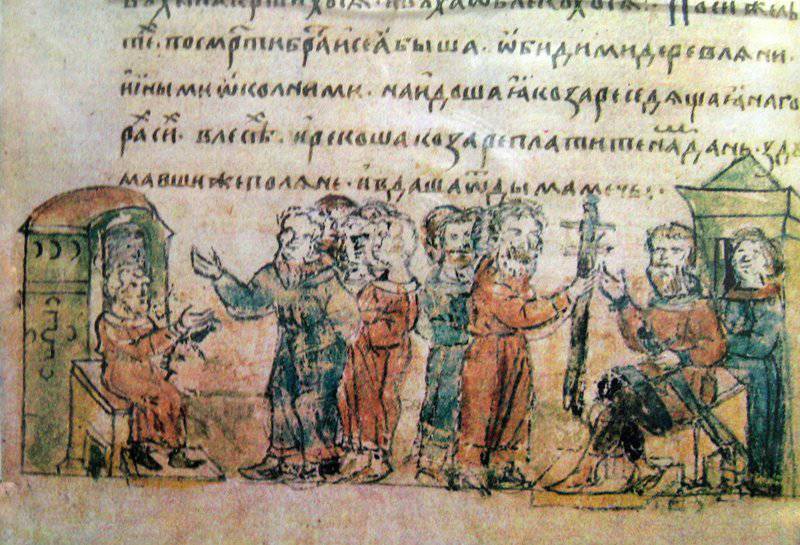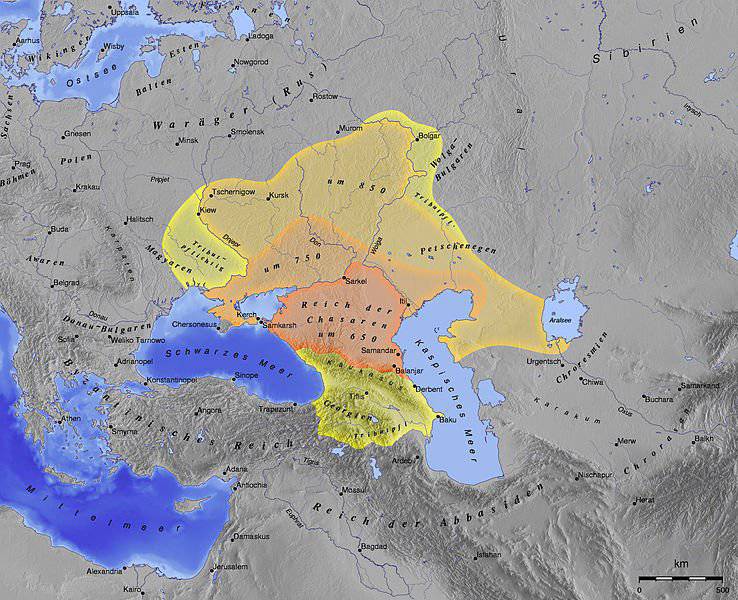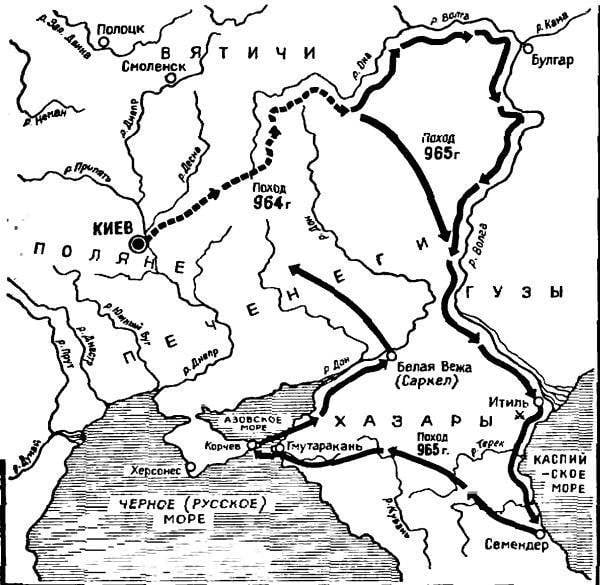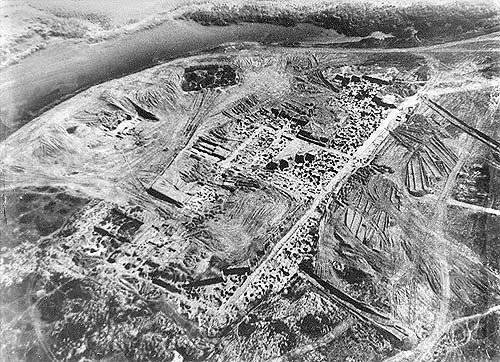Saber kick of Svyatoslav on the Khazar "miracle-yuda"
In Kiev, have not forgotten the events associated with the defeat of the mission of Adalbert ("Coming on you!" Educating the hero and his first victory), and already new news excited the townspeople. Prince Svyatoslav and his team defeated Christian missionaries, effectively removing Mother Olga from power, firmly taking over the reins of government. A short but eventful reign of a prince-warrior begins. Kiev in this period was filled with the spirit of a druzhny, which the prince actively supported. Next to him were the gray-haired commanders Sveneld, Asmud, and others who had gone through the war with Byzantium and the eastern hikes. Squad replenished and young warriors. Warriors from tribal unions, "hunters", arrived in Kiev. The city was filled with rumors of new hikes. The question was - where will the young knight direct his shelves?
Svyatoslav decided to complete the work of his ancestors and crush the parasitic state of the Khazars, who lived at the expense of trade duties, holding in his hands all the exits from Eastern Europe to the east and southeast. The Khazars took huge duties from merchants' caravans, and at a convenient opportunity they simply robbed Russian merchants. Under the rule of the Khazars were Slavic lands, which paid tribute to the Khazars. The Khazar elite replenished their wealth at the expense of the slave trade. Thousands of Slavs were sold to eastern countries. In addition, there is an assumption that Svyatoslav wanted to avenge the death of the Prophetic Oleg. According to one version, it was the Khazar "snake" (symbol of betrayal) that caused the death of Prince Oleg. In the period of 912 / 914, the Russian army went on a campaign in Transcaucasia and Persia, on the way back it was ambushed and the Khazars almost completely destroyed it with a long bloody battle (Caspian campaign Rus 912 year). Even if Oleg did not fall in this battle, the blood of Russian soldiers appealed for revenge, as well as thousands of other Rus killed in fights with Khazars or captured and sold into slavery. The Ruses then lived on the principle of blood for blood, responding to a blow with a blow.

Tribute to the Khazars, the miniature of the Radziwill Chronicle, 15th century.
In the spring of 964, the roads barely dried up, the Russian army marched. The squads did not go the usual way along the Dnieper, in boats, but on horseback and on foot to the east. Later, the chronicler will note: “I give the idea to the River Oka and the Volga, and the Vyatichi go to hell, and to the recipe of the Vyaticha:“ To whom do you give tribute? ”They decided (said):“ We’ve given Kozarom from ral (plow) ”. In this short phrase is covered a whole page of Russian stories - the epoch of the liberation of the Eastern Slavic lands from the Khazar yoke and their unification into a single Russian state. Khazar Khaganate was a traditional opponent of Russia, the enemy stubborn, cunning and cruel. Wherever it was possible, the Khazars opposed Russia, closed the road to the East, creating a powerful anti-Russian alliance as part of Volga Bulgaria, Burtases, some tribes of the Volga region and the North Caucasus. The Khazars did not rejoice at the fact that a powerful Varangian dynasty appeared in Russia, which began to work hard to unite the Eastern Slavic lands into a single whole and seriously reduced the influence of the Khazars on the Russian lands. Now, the Vyatichi, a strong tribal alliance that occupied lands in the basin of the Desna, the Upper and Middle Oka, the tributaries of the Oka, on the Don (in Arab sources, the country Vantit), stopped paying tribute to the Khazars and became part of the Russian state.
For more than a century, Russia, step by step, ousted the Khazar Khaganate from Slavic territory. In addition, the Khazar Khaganate was weakened by the civil war, when the Jews seized power, drowning their rivals in blood. The Crimean Goths came under the rule of Byzantium. The steppes between the Volga and the Don began to occupy the Pechenegs. Guzes appeared on the eastern borders. Volga Bulgaria began to show more independence. Now refused to pay vyatichi. But in the middle of the 10 century, Khazaria was still a serious opponent and the main enemy of the growing Russian state. The Khazar Khaganate represented a serious military threat to Russia. Archaeologists have discovered a whole system of stone fortresses on the right bank of the Don, North Donets and Oskol. One white-stone stronghold was located at a distance of 10-20 kilometers from the other. Cemeteries were found near the walls, and mercenary soldiers were buried in them. The fortresses were located on the right, western and northwestern banks of the rivers. An important role in the construction of these fortresses was played by Byzantine engineers. So, Sarkel (Belaya Vezha) on the bank of the Don was built by Byzantine engineers led by Petron Kamatir. “Since there were no stones suitable for building a fortress on site, he built furnaces and burnt a brick into them, he made a fortress building of them, making lime from small river shells,” wrote Konstantin Bagryanonny in his work “On Empire Management”. Sarkel became the main fortress of the Khazars on the northwestern border of the country. It housed a permanent garrison of 300 warriors.
If fortresses were to solve defensive tasks, they should have been located on the east bank, making an additional, natural defensive line from the river. On the right bank, these were outposts, actually advanced to the enemy shore, necessary as springboards for attacking, covering the crossing of troops and their withdrawal. Of these, small detachments committed predatory raids. Close to this line of the Khazar fortresses came Slavic lands. Arab geographer Al-Idrisi reported that Khazar vassals regularly made raids on the Slavs, in order to steal people for sale into slavery. These were not just spontaneous raids, but long-term, targeted and regular robbery (“sucking blood”) from the state of the parasite. As noted above, in the last period of the Khazars, the power in it was seized by the Jews representing the caste of rakhdonites (radhonites or radanity). These were merchants who controlled trade between the Islamic East and Christian Europe along the Silk Road and other trade routes, a huge permanent trading network stretching from China and India to Western Europe. One of their main "goods" were people. It was a caste of people acquiring enormous riches on the mountain, suffering and death of thousands and thousands of people. The Rakhdonites controlled Khazaria, and were also one of the main "pushers" (the second was Rome) of the military-political process, known as the "rush to the East." In Europe, knights and mercenaries killed the Slavic civilization on the lands of modern Germany and Austria. Slavic men in their mass died in battles, and Jewish merchants drove children and young women to markets in the Middle East. From the east, the same role was played by well-armed detachments of mercenaries from Khazaria.
Russian epics have preserved the memory of the Khazar attacks, so the epic “Fedor Tyarin” reports:
From the east was
From the king was Jewish,
From his power Yiddish
Arrived Kalena arrow.
Many Slavic unions of tribes and tribes paid tribute to the Khazars for a long time. Glade, according to the Tale of Bygone Years, was paid homage with swords. Given what the sword meant for the warrior of the northern peoples, and the complexity of its production, the high cost of living, it was a heavy tribute. But even harder and more terrible were paying tribute to other lands - northerners, Viatichi and Radimichi. They not only paid tribute with silver (shlyag - Khazar coin, the word comes from the word shekel, according to another version - from the European "shilling"), but also according to the information of the Laurentian and Ipatiev chronicles they took from "smoke" (household, family) veveritse ". Historians have long argued what it means and agreed on a "squirrel." However, as early as the 15 century in the Moscow principality (formerly the land of the Vyatichi), the penalty for a bruise was 15 (!) Squirrels. Thus, Russians from Russians, and not from a family, a community, but from one person, not as a tax, but just a fine for a petty offense (a fight) took 15 squirrel pelts. Everything becomes clear if we compare the data with another chronicle. The Radziwill Chronicle reports that the Khazars took: “according to the white girl with smoke”. And next to it in miniature, so that there was no mistake, they didn’t take it for a slip of hands, a group of girls and an elder are shown, bowing before Khazarin. This is fully consistent with the data that are known about the Khazar Kaganate. In the Khazaria rules of the clan of slavers, alien to the norms of morality and who measured everything in gold. Perhaps it is this shameful and disgusting phenomenon that will become the basis for fairy tales and byli “miracle yudah the shit”, “snake” demanding red maidens. In a somewhat later historical period, the Crimean Khanate, living on plunder and selling people into slavery, would be the same parasitic state. By the time of Svyatoslav’s rule, people almost did not pay this tribute, the military successes of the former princes had an effect. However, the Khazars continued to take people in full for sale into slavery during their military raids.

Khazaria.
Pogrom of Khazaria
In the spring of the 965 regiment of Svyatoslav I will move to Khazaria. The prince spent the winter in the lands of the Vyatichi, convincing their elders of the need to submit to Kiev. Vyatichsky warriors joined the army of Svyatoslav. They were skillful forest warriors and scouts. Russian commanders loved to ask unexpected and daring riddles to their opponent. Even the experienced and sophisticated Greeks, who had well-developed intelligence, were at a standstill during the lightning and unexpected attacks of the Russian troops on Constantinople. Svyatoslav also chose an unusual way. He decided to strike the capital of the Kaganate not from the west, from the north. The Khazars, on the other hand, usually waited for the arrival of the Rus by water from the Don and the Sea of Azov.
The Russian army went along the old trade route leading to the banks of the Volga, to the city of Bulgar - the capital of the Volga Bulgars. From Kiev, Russian trade caravans went to the area of modern Voronezh, then through the forest-steppe lands to the Penza region and south of Tambov, then through the Mordovian lands to the right bank of the Volga. It was on this path that Svyatoslav subjugated the Vyatichi and moved on. He struck at the permanent allies of the Khazars - the Bulgars and Burtases. Svyatoslav defeated the Allies of Khazaria, depriving Kagan of part of military contingents. The Burtas were broken and scattered, the cities of the Volga Bulgars were captured, their capital was devastated. The enemy did not expect a strike from the north, so the resistance was small. Burtasy and Bulgars preferred to flee and wait out the thunderstorm.
Russ went down the Volga and entered into the possession of the Khazar Kaganate. Infantry moved on lodyah, and the Russian and allied Pechenezh cavalry along the coast. The Khazars, having learned about the approach of the regiments of Svyatoslav, were made in battle. Somewhere in the lower reaches of the Volga, near the capital of the Kaganate, Itil, a decisive battle took place. Khazar King Joseph managed to gather a large army. The king (bek) was the head of government, who had real power, and the kagan with the Jews retained only sacral functions. The Khazars marched towards the Russian troops.
The Khazars adopted Arab tactics, and in battle lined up in four battle lines. The first line - skirmishers, consisted of horse archers, "black Khazars", mainly from poor families. Among the Arabs, the first line was called "Dog Barking Morning". These warriors were not constrained by heavy weapons, the basis of their weapons made bows and light throwing spears-darts. They began the battle first, showered the enemy with projectiles, trying to upset his ranks and force him to a premature and poorly organized attack. The second line, supporting horse archers, consisted of heavy cavalry. These were the "White Khazars" - the squads of the Khazar nomadic nobility. The warriors were well-armed - iron breastplates, leather armor and chain mail, helmets, shields, long spears, swords, sabers, clubs, axes. It was a selective cavalry, striking at the enemy’s disrupted ranks, breaking his line. For Arabs, the second line was called “Day of Help”.
If the second line did not reach full success, and the enemy continued to resist, the third line entered the battle. The heavy cavalry parted ways and went on the attack (or took the enemy's blow upon themselves) another line - “Shock Evening”. It consisted of numerous infantry, including the militia of the capital. The basis of infantry weapons were spears and shields. The infantrymen, to repel the attack of the enemy, lined up a protective wall, hiding behind shields and bristling with spears. The first row was kneeling down. The shafts of the spears rested against the ground and with their points directed towards the enemy. To overcome such a wall without serious losses was difficult. While the third line was fighting, the Khazar cavalry could regroup and strike a new blow at the enemy who was stuck in the infantry.
In case of emergency, the fourth line could be entered into battle - in Arabic “The Sign of the Prophet” (the Khazars called it the “Sun of the Kagan”). It was the thousands of selected guards from the mercenary warriors. The line was equestrian, chained into iron, professional Muslim mercenaries. This line was taken to the battle personally by the king. The appearance of the Russian army near the walls of Itil puzzled the Khazar elite, before that the Slavs were limited to border raids. Therefore, King Joseph carried out a full mobilization of all combat-ready inhabitants of Itil. The arsenals of the capital were enough to arm everyone. The Khazar army significantly surpassed the army of Svyatoslav.
Russian troops were the usual "wall". In the front ranks, the most well-armed and protected warriors of Svyatoslav are the elite of the Russian army. The advanced warriors were protected by metal armor and chain mail covering even the warrior's legs, with shields. They were armed with spears and axes. They were followed row by row by the rest of the infantry. The cavalry - the prince's squad and the Pechenegs covered the flanks.
Khazar king ordered to give a signal to attack. The Khazar lines one after another broke on the Russian “wall”. The Khazars could not do anything with the soldiers of Svyatoslav. Russian army continued to attack, knocking over enemy forces time after time. Russ boldly went into battle, smashing the enemy with spears, swords and axes. The field was littered with the corpses of the Khazars. In the end, the Khazars could not stand it and ran. Some researchers believe that the kagan also fell in this battle, who left the capital to cheer on the soldiers with his sacred figure. King Joseph with the remaining Guardsmen went on a breakthrough and was able to break out of the encirclement, at the cost of killing most of the detachment. Itil had no one to defend. The remaining troops fled.
Russian squads entered the deserted Khazar capital. The townspeople fled to the steppe or took refuge on the numerous islands of the mouth of the Volga. The fate of Itil can be understood only by the fact that archaeologists have not yet discovered its traces. Sacred revenge took place. It seemed that you can move to Russia - the main goal is completed. The Khazar Khaganate suffered a terrible defeat, his army was destroyed, its remnants scattered, the capital was wiped off the face of the earth. Kaganate received a mortal wound. But the campaign was continued. Gadinu had to finish. Svyatoslav led the retreats along the Caspian coast to the south, to the old capital of Khazaria, Semenderu. It was a large city on the territory of the Caspian Dagestan. Semender was ruled by its own king, who had his own army and fortresses. It was an autonomous region. Semenderskoe army was crushed and scattered over the surrounding mountains. King Salifan (from the Arab family) and the nobles fled. Semender taken without a fight. Further south Svyatoslav did not go.
From Semender, Svyatoslav's army marched through the lands of the Kasogs and Alans. Alan-Kasozhsk rati regiment Svyatoslav also swept. Another major clash with the Khazars occurred at the fortress of Semikar, built to protect the land route to the mouth of the Don. The garrison refused to surrender to the mercy of the winner. The fortress was taken by storm. The movement of the troops was swift. While some regiments were resting, others moved forward, carried out reconnaissance, cleared the way, shot down enemy barriers, captured herds of horses. Svyatoslav led the troops to the coast of the Surozh (Azov) Sea. Here were located two large centers of the Khazar state - Tamatarkha (Tmutarakan) and Kerchev. There were no serious fights here. Local residents also suffered from the power of the Khazars and as the Russian army approached, an uprising broke out in Tmutarakan. Khazar governor threw the citadel and, together with the garrison on the ships, crossed the strait and fled to Crimea, to Kerchev. However, the Khazars could not defend the Kerchev (Korchev) either. And here the people revolted, helping to take the city.
Prince Svyatoslav in Tmutarakan and Korcheva showed not only the courage and high fighting qualities of his rati, but also his discipline and justice. The inhabitants of the coastal trading cities were not the enemies of the Rus and the cities did not destroy and burn. Cities became part of Russia. Thus, reaching the coast of the Azov Sea, Svyatoslav defeated most of the Khazars. From the Khanate there were only fragments that were left to be “eaten” by the Pechenegs.
In Khazaria there was only one “tough nut” - Sarkel. It was one of the most powerful fortresses of Kaganate. Having set aside a detachment of retainers and grateful residents in Tmutarakan, Svyatoslav moved on. Soon there will be another Russian region - Tmutarakanskaya principality. Sarkel had six powerful towers, visible from afar. The fortress stood on a cape, which from three sides was washed by the waters of the Don. From the fourth side a deep ditch filled with water was dug. At the distance of the arrow from the walls, from the land, a second ditch was dug. Sarkel was considered impregnable. In the fortress there was not only a garrison, but King Joseph took refuge with the remnants of the troops. In the White Wiege there were large warehouses with food supplies, which made it possible to withstand a long siege. The king of Khazaria hoped to wait out a military thunderstorm in this powerful fortress and begin to restore the ruined.
The Russian army approached the fortress from land — cavalry, and infantry along the river in boats. The siege began. In this battle, the Ruses showed the ability to take well-defended fortifications by storm. Ditches covered with earth and all that was suitable for this business. When the Russian troops moved to the assault, their arrows (complex Russian bows were terrible weapons) showered the walls with a hail of arrows. The fortress was taken on a spear using assault stairs and ram. The last fierce battle took place in the tower of the citadel, where the Khazar king tried to fight off with protection. There was no mercy, all the Khazars were slaughtered. This battle showed that Svyatoslav’s warriors would not be stopped by serious fortresses. Prince Svyatoslav Igorevich returned to Kiev with fame and rich booty.

Results
It was a brilliant victory. The ghoul state, a century and a half drank the blood of neighbors and tributaries, collapsed in a year. Svyatoslav made an unprecedented military campaign for that era, a length of about 6 thousand kilometers. During it, hostile Bulgars and Burtases were defeated, the Khazar Empire experienced a terrible pogrom and disappeared from the political map of the world. Svyatoslav and his army showed brilliant fighting qualities. Svyatoslav used combined tactics using infantry, heavy Russian and allied, light Pecheneg cavalry. He moved swiftly, often landing infantry on ships when the cavalry was on land. Russian army defeated not one strong enemy army, captured several serious fortresses.
As academician B.A. Rybakov wrote: “The campaigns of Svyatoslav 965-968. they represent, as it were, a single saber strike, which drew a wide semicircle on the map of Europe from the Middle Volga region to the Caspian Sea and further along the North Caucasus and the Black Sea region to the Balkan lands of Byzantium. The Volga Bulgaria was defeated, the Khazaria was completely defeated, Byzantium was weakened and intimidated ... The locks that locked the trading routes of the Rus were knocked down. ” The Russian state got the opportunity to start a wide trade with the East. Rus created outposts in Tmutarakan and in the White Vezha. “In all these actions we see the hand of the commander and statesman who is interested in the elevation of Russia and the consolidation of its international position. A series of campaigns of Svyatoslav Igorevich was wisely conceived and brilliantly executed. ”
Russian sources are silent about what steps Svyatoslav took to control the conquered land. This gave some researchers a reason to accuse Prince Svyatoslav of excessive militancy, wasting of his forces and resources on campaigns unnecessary to Russia. But the knowledgeable Arab geographer and traveler Ibn-Haukal reveals the nature of the relationship between Rus and the local population. The Burtas, Bulgars and Khazars, defeated and scattered by the Rus, soon returned to their lands. “They,” the Arabic author informs, “hoped, asked for an agreement with them, and they would be submissive to them (the Russians) because (the Ruses) did him (Shirvanshah) a blessing for them (the refugees).” The point is that many Khazars, fleeing from the invasion, fled into the possession of the Shirvanshah to Derbent, and then after some beneficence of the Rus against the refugees through the Shirvanshah were able to return to their lands. This message is very important. It shows that having cut out the Khazar political, military and trade elite (part of them fled), completely destroying the military component of the kaganate, wiping off all its military strongholds from the face of the earth, having generally performed an operation to “pacify” the enemy, the Rus were not going to make trouble for ordinary people . The civilian population was invited to return to the old places. Perhaps Svyatoslav even gave guarantees to Shirvanshah that no harm would be caused to the refugees. Everyone knew that the pagan russes were keeping the word holy. The regions of the Volga region, the Don region, the Azov region, and parts of the North Caucasus passed under Russian patronage. In a number of outposts, small Russian detachments were left.
Svyatoslav received complete supremacy in Eastern Europe. The Volga and North Caucasian allies of the Khazars received a vivid military lesson. Worried in the Byzantine Empire, closely watching the exploits of the Russian prince. The balance of forces in the region has changed dramatically in favor of Russia.

Aerial photography of Sarkel Fortress, 1951g.
To be continued ...
Information